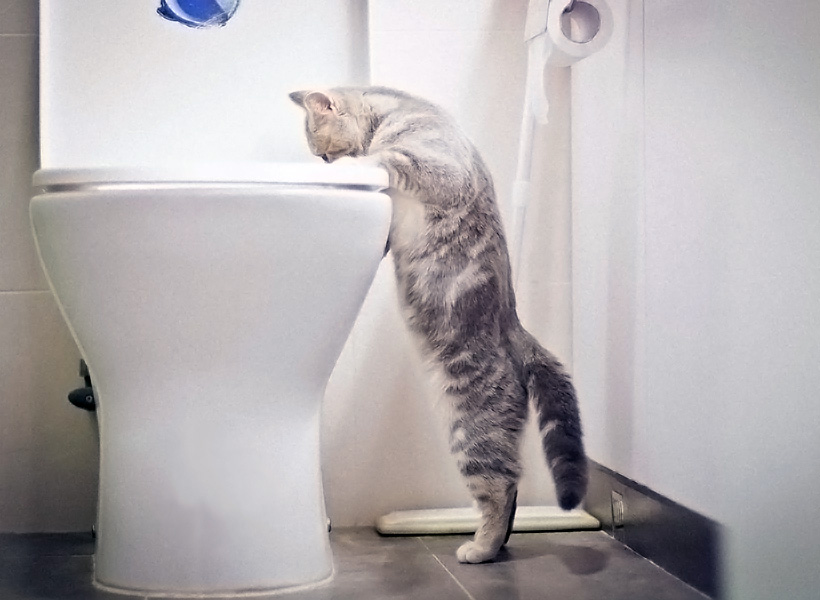The Dangers of Flushing Cat Poop Down Your Toilet - Advice for Safer Disposal
The Dangers of Flushing Cat Poop Down Your Toilet - Advice for Safer Disposal
Blog Article
What are your ideas regarding Don’t flush cat feces down the toilet?

Intro
As cat owners, it's vital to be mindful of how we deal with our feline good friends' waste. While it might appear practical to purge pet cat poop down the toilet, this method can have detrimental consequences for both the environment and human health and wellness.
Alternatives to Flushing
The good news is, there are safer and extra responsible means to take care of pet cat poop. Consider the complying with options:
1. Scoop and Dispose in Trash
The most typical technique of getting rid of pet cat poop is to scoop it right into an eco-friendly bag and toss it in the garbage. Make sure to make use of a committed trash scoop and deal with the waste immediately.
2. Use Biodegradable Litter
Opt for eco-friendly pet cat litter made from materials such as corn or wheat. These trashes are eco-friendly and can be safely disposed of in the trash.
3. Bury in the Yard
If you have a backyard, take into consideration burying cat waste in a designated location away from veggie gardens and water resources. Make certain to dig deep sufficient to prevent contamination of groundwater.
4. Install a Pet Waste Disposal System
Purchase a pet dog waste disposal system specifically designed for pet cat waste. These systems utilize enzymes to break down the waste, minimizing smell and environmental impact.
Wellness Risks
Along with ecological issues, flushing pet cat waste can additionally present health risks to human beings. Feline feces might have Toxoplasma gondii, a bloodsucker that can cause toxoplasmosis-- a possibly severe illness, especially for expecting females and individuals with damaged immune systems.
Ecological Impact
Purging pet cat poop introduces harmful virus and parasites into the supply of water, positioning a substantial risk to water environments. These pollutants can negatively affect marine life and concession water high quality.
Final thought
Responsible pet possession prolongs past supplying food and sanctuary-- it additionally involves proper waste administration. By avoiding flushing feline poop down the toilet and going with alternative disposal approaches, we can minimize our ecological footprint and secure human health and wellness.
Why Can’t I Flush Cat Poop?
It Spreads a Parasite
Cats are frequently infected with a parasite called toxoplasma gondii. The parasite causes an infection called toxoplasmosis. It is usually harmless to cats. The parasite only uses cat poop as a host for its eggs. Otherwise, the cat’s immune system usually keeps the infection at low enough levels to maintain its own health. But it does not stop the develop of eggs. These eggs are tiny and surprisingly tough. They may survive for a year before they begin to grow. But that’s the problem.
Our wastewater system is not designed to deal with toxoplasmosis eggs. Instead, most eggs will flush from your toilet into sewers and wastewater management plants. After the sewage is treated for many other harmful things in it, it is typically released into local rivers, lakes, or oceans. Here, the toxoplasmosis eggs can find new hosts, including starfish, crabs, otters, and many other wildlife. For many, this is a significant risk to their health. Toxoplasmosis can also end up infecting water sources that are important for agriculture, which means our deer, pigs, and sheep can get infected too.
Is There Risk to Humans?
There can be a risk to human life from flushing cat poop down the toilet. If you do so, the parasites from your cat’s poop can end up in shellfish, game animals, or livestock. If this meat is then served raw or undercooked, the people who eat it can get sick.
In fact, according to the CDC, 40 million people in the United States are infected with toxoplasma gondii. They get it from exposure to infected seafood, or from some kind of cat poop contamination, like drinking from a stream that is contaminated or touching anything that has come into contact with cat poop. That includes just cleaning a cat litter box.
Most people who get infected with these parasites will not develop any symptoms. However, for pregnant women or for those with compromised immune systems, the parasite can cause severe health problems.
How to Handle Cat Poop
The best way to handle cat poop is actually to clean the box more often. The eggs that the parasite sheds will not become active until one to five days after the cat poops. That means that if you clean daily, you’re much less likely to come into direct contact with infectious eggs.
That said, always dispose of cat poop in the garbage and not down the toilet. Wash your hands before and after you clean the litter box, and bring the bag of poop right outside to your garbage bins.
https://trenchlesssolutionsusa.com/why-cant-i-flush-cat-poop/

I ran across that write up on Don’t flush cat feces down the toilet when surfing around the search engines. Sharing is caring. Helping others is fun. Many thanks for your time spent reading it.
Click Here Report this page